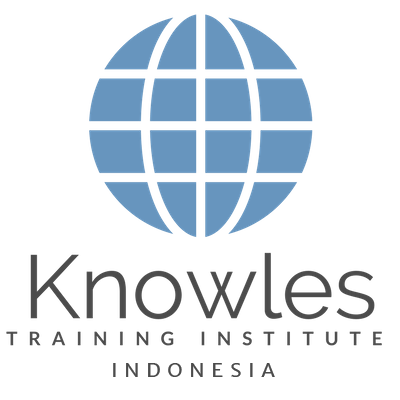Ergonomics In The Workplace Training Course In Indonesia
Our corporate training course is also available in Jakarta, Surabaya, Bandung, Bekasi, Medan, Tangerang, Depok, Semarang, Palembang, Makassar, South Tangerang (Tangerang Selatan), Batam, Bogor, Pekanbaru, Bandar Lampung, Padang, Malang, Surakarta (Solo), Balikpapan, Denpasar, Samarinda, Cimahi, Yogyakarta, Banjarmasin, Serang, Jambi, Pontianak, Manado, Mataram, Batu, Ubud (Bali), Bali, Lombok, Surakarta, Manado, Makassar, Semarang, Balikpapan.
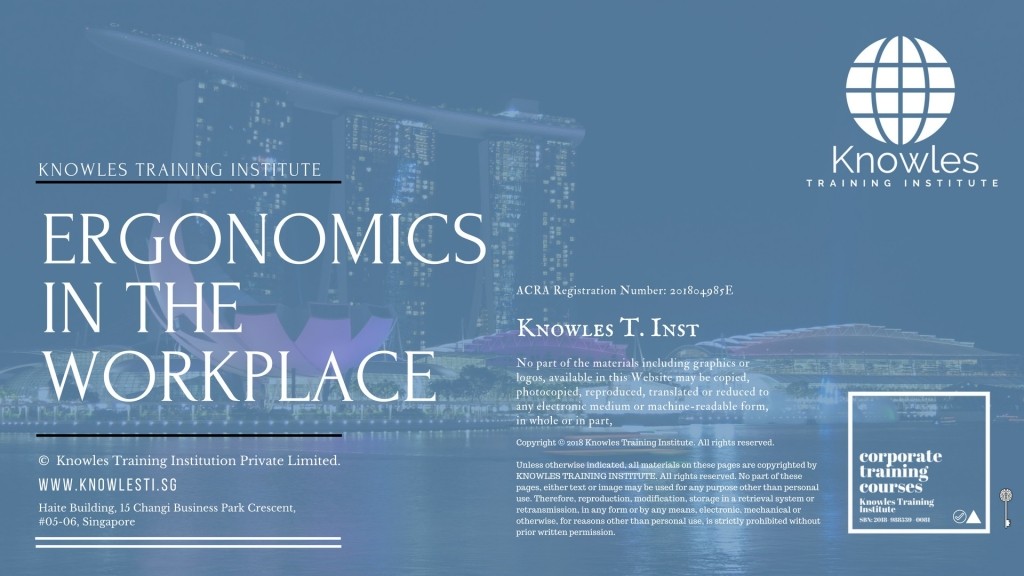
About This Ergonomics In The Workplace Training Course in Indonesia
Ergonomics In The Workplace Course in Indonesia
Getting the job done requires a lot of focus; and in order to focus, comfortable working conditions must be set to create a favourable workplace. Acknowledging ergonomics in the office will not only help improve working conditions but will also produce excellent results. Find out how to foster ergonomics in the workplace and how to use it to your firm’s advantage.
Who Should Attend This Ergonomics In The Workplace Course in Indonesia Workshop
This Ergonomics In The Workplace course in Indonesia workshop is ideal for anyone who would like to gain a strong grasp and improve their Ergonomics In The Workplace.
All Staff Within An Organisation
Managers
Team Leaders
Executives
Assistants
Officers
Secretaries
Group Size For This Ergonomics In The Workplace Training Program in Indonesia
The ideal group size for this Ergonomics In The Workplace course in Indonesia is:
Minimum: 5 Participants
Maximum: 15 Participants
Course Duration For This Ergonomics In The Workplace Skills Course in Indonesia
The duration of this Ergonomics In The Workplace Course in Indonesia in Indonesiaworkshop is 2 full days. Knowles Training Institute Indonesia will also be able to contextualised this workshop according to different durations; 3 full days, 1 day, half day, 90 minutes and 60 minutes.
2 Full Days
9 a.m to 5 p.m
Ergonomics In The Workplace Course in Indonesia Benefits
Below is the list of course benefits of our Ergonomics In The Workplace course in Indonesia
- Give a thorough understanding of ergonomic principles, empowering them to recognise and manage potential health and safety risks. Participants can lower their risk of work-related injuries and musculoskeletal disorders by putting ergonomic measures into practice.
- Learning how to optimise workstations, tools, and procedures help increase productivity, perform effectively, and have better attention by removing unnecessary physical stress and discomfort.
- Be able to design comfortable workspaces adapted to their needs. This lessens their discomfort and fatigue and improves their overall comfort throughout work hours. Understanding their own optimal posture, workstation arrangement, and equipment changes also helps.
- Employing ergonomic procedures can assist in lowering absenteeism from work-related illnesses and injuries. Participants can also support greater worker satisfaction and lower staff turnover by ensuring a healthier and more comfortable workplace.
- Participants who learn ergonomics-related information and abilities are better prepared to perform their job duties. The course fosters greater engagement and motivation by giving workers the tools to enhance their workspaces and lessen the physical discomfort.
- Recognise risk factors, apply the knowledge acquired, and lower the risk of musculoskeletal disorders (MSDs) which is common in workplaces with poor ergonomics.
- Proper body mechanics and posture for a variety of work duties will be taught which lessens the strain on their spine, joints, and muscles, improving posture and preventing long-term health problems.
- A pleasant and encouraging workplace has a favourable effect on job satisfaction. The course encourages increased job satisfaction by giving participants the skills to design ergonomic environments, as employees feel cherished and cared for by their employers.
- Implementing ergonomic standards can help organisations save a lot of money by lowering the likelihood of workplace accidents and health problems. By finding and putting ergonomic solutions into practise, course participants can help to achieve these savings by minimising the medical costs and productivity losses linked to work-related accidents.
- The importance of work-life balance is emphasised in the course on ergonomics in the workplace. Having an improved balance between the demands of the workplace and personal well-being can be achieved by adopting ergonomic techniques.
- Focusing on ergonomics reflects a company’s dedication to employee welfare. Organisations can improve employee morale and foster a good work environment by giving employees the chance to take the Ergonomics in the Workplace course.
- Participating in this course equips individuals with valuable skills that can enhance their professional development. Knowledge of ergonomics is highly sought in various industries, and participants can leverage this expertise to advance their careers and take on workplace health and safety roles.
Ergonomics In The Workplace Course in Indonesia Objectives
Below is the list of course objectives of our Ergonomics In The Workplace course in Indonesia
- Have an understanding of the fundamental principles of ergonomics and how to apply them within the workplace.
- Gain the ability to recognise common ergonomic hazards that might cause musculoskeletal disorders and work-related injuries.
- Know how to examine and detect potential ergonomic issues in work processes and workstations.
- Learn proper body mechanics and postures to avoid strain and injuring yourself while working on tasks.
- Recognise the value of workstation setup, including desk organisation, chair ergonomics, and equipment placement.
- Be able to confidently choose and evaluate ergonomic furniture, tools, and equipment that help promote comfort and productivity.
- Learn to manage and prevent common musculoskeletal conditions linked to work-related activities.
- Recognise the role that ergonomics play in reducing the risk of repetitive strain injuries (RSIs) and other workplace-related illnesses.
- Know about ergonomic design principles for offices, manufacturing and healthcare facilities, and other specific work contexts.
- Discover how to encourage workplace wellness and engagement by putting ergonomics into practise.
- Appreciate the role that ergonomics play in enhancing work quality, productivity, and efficiency.
- Learn skills needed to create and implement ergonomic interventions that reduce hazards and enhance workplace ergonomics as a whole.
Course Content For This Ergonomics In The Workplace Training Course in Indonesia
Below is the list of course content of our Ergonomics In The Workplace training course in Indonesia
- Ergonomics, an Introduction
- Learning the Basics: Definition and Scope
- Ergonomics and its Importance in the Modern Workplace
- Ergonomic Hazards and Risk Assessment
- Identifying Common Workplace Ergonomic Hazards
- Tools and Methods for Conducting Ergonomic Assessments
- Body Mechanics and Posture
- Principles for Good Body Mechanics
- Maintaining the Best Posture during Work Tasks
- Workspace Design and Setup
- Setting-Up an Ergonomic Workspace
- Workspace Lighting and Environmental to Consider
- Ergonomic Tools and Equipment
- Choosing and Evaluating Ergonomic Furniture, Tools, and Accessories
- Modern Ergonomics: Things to Consider for Computer Workstations
- Musculoskeletal Disorders and Ways to Prevent
- Recognise Common Musculoskeletal Conditions in the Workplace
- Ways to Manage and Prevent Work-Related Injuries
- Workplace Ergonomics in Specific Situations
- Designing Ergonomic Workspaces for Businesses
- Ergonomics in Manufacturing and Industrial Facilities
- Ergonomics in Healthcare
- Challenges in Patient Handling, Surgical Techniques, and Medical Equipment
- Creating Ergonomic Healthcare Environment Strategies
- Employee Well-Being and Engagement
- The Relationship between Employee Engagement and Ergonomics
- Using Ergonomics to Improve Employee Well-Being
- Ergonomics and Productivity
- Productivity and Efficiency Enhancing through Ergonomics
- Ergonomic Design to Optimise Task Performance
- Interventions and Solutions with Ergonomics
- Effective Ergonomic Design Interventions for Workplace Improvement
- Evaluating and Implementing Ergonomic Solutions
- Putting it into Practice
- Making Ergonomics Part of Organisational Culture and Policies
- Individualised Action Plans for Integrating Ergonomics into Everyday Work
Ergonomics In The Workplace Course in Indonesia Value Added Materials
Each participant will receive the following materials for the Ergonomics In The Workplace course in Indonesia
Ergonomics In The Workplace Course in Indonesia Learner’s Guide

Ergonomics In The Workplace Course in Indonesia Handouts
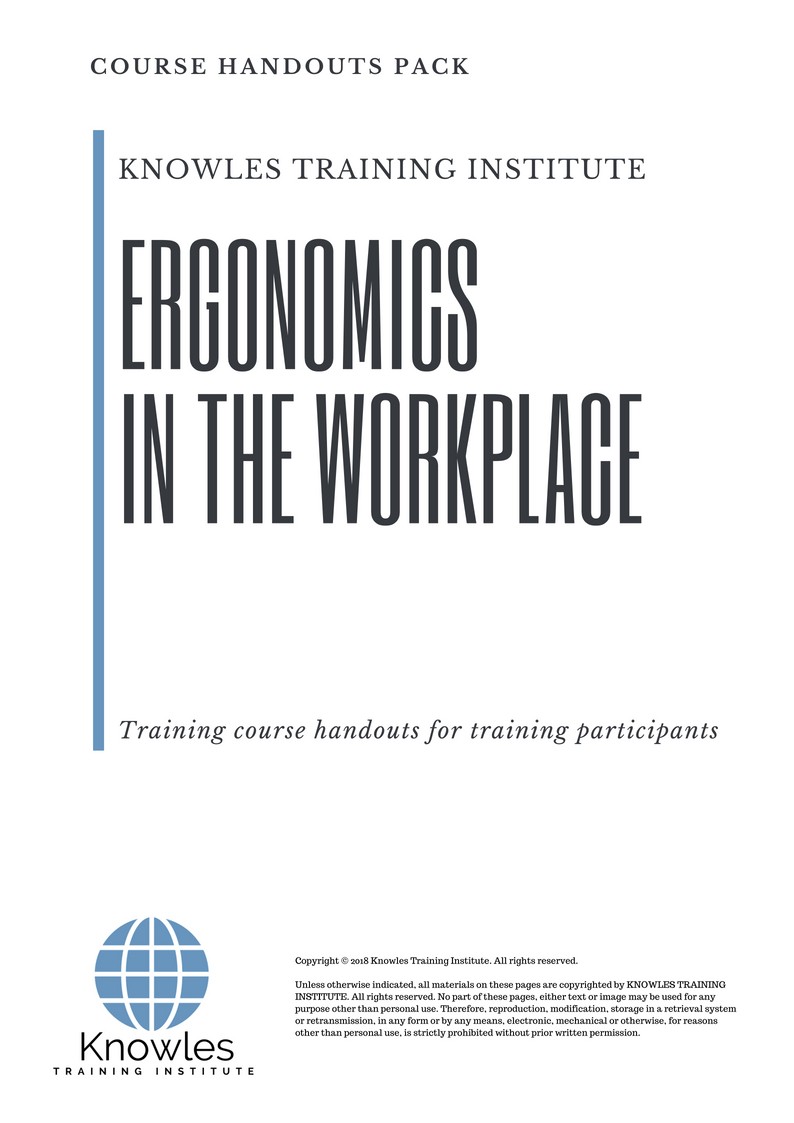
Ergonomics In The Workplace Course in Indonesia PPT Slides Used During Course

Ergonomics In The Workplace Course in Indonesia Certification
Each course participant will receive a certification of training completion
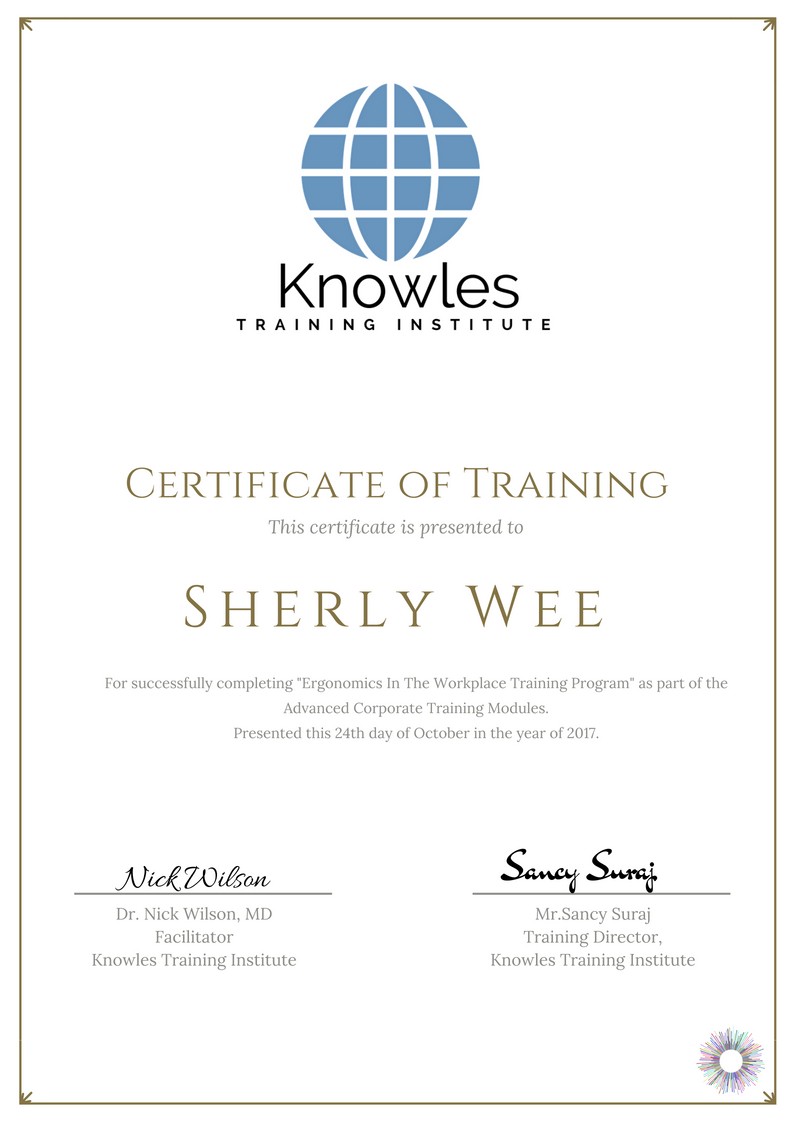
Course Fees For Ergonomics In The Workplace Training Course In Indonesia
There are 4 pricing options available for this Ergonomics In The Workplace training course in Indonesia. Course participants not in Indonesia may choose to sign up for our online Ergonomics In The Workplace training course in Indonesia.
- USD 679.97 For a 60-minute Lunch Talk Session.
- USD 259.97 For a Half Day Course Per Participant.
- USD 419.97 For a 1 Day Course Per Participant.
- USD 569.97 For a 2 Day Course Per Participant.
- Discounts available for more than 2 participants.
Upcoming Ergonomics In The Workplace Training Course in Indonesia Schedule
Contact us for the latest Ergonomics In The Workplace course in Indonesia schedules:
Email: contact@knowlesti.id
Message:
Download Ergonomics In The Workplace Course in Indonesia Brochure

Request for this Ergonomics In The Workplace course in Indonesia brochure. Fill up the short information below and we will send it to you right away!
Post Training Support: A vast majority of training does not have any effect beyond 120 days. To work, training has to have a strong pre- and post-training component. Post-training reinforcement helps individuals to recall the understanding and ask questions.
Blended Learning: Learning does not occur in the classroom. Virtually everybody prefers distinct ways of learning. Successful learning should have a multi-channel, multi-modal strategy.
- We Understand The Industry: We’ve got a profound comprehension of the business, business design, challenges, strategy and the that our participants are in and have designed the courseware to cater to their professional needs.
- Course Content: Knowles Training Institute’s material is relevant, of high quality and provide specific learning results. Participants will leave the training course feeling as they have gained a strong understanding and will also be in a position to execute what they have learned sensibly.
Course Development — The workshop modules follow a systematic and logical arrangement. This structure helps to ensure that the course material allows the facilitators to deliver the course in a logical arrangement. Consider the subjects as building bricks into learning, our facilitators slowly build towards a comprehensive picture of this entire topic.


Course Enquiries
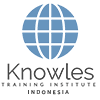
Fill up the form and we will get back to you in less than 1 working day.
Alternatively, give us a call to have one of our training consultants contact you. Our corporate training courses can be contextualized to meet your organization’s training needs. Leverage on our large pool of professional trainers and consultants for your organization’s training needs.
Email: contact@knowlesti.id
We Guarantee 100% Privacy. We Respect Your Privacy. Your Information Will Never Be Shared.
